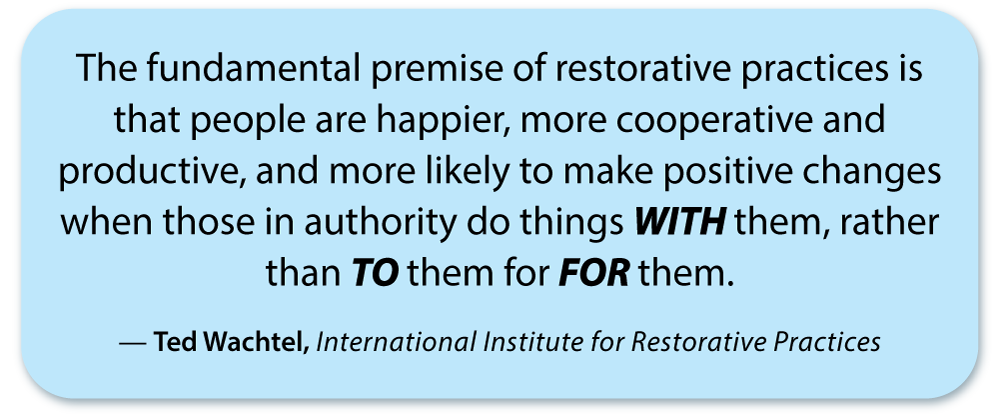Building Community Through
Restorative Practices
Free webinar for K-12 teachers
August 13, 2020 3 - 4 p.m.
Leadership Through
Restorative Practices
Free webinar for K-12 administrators
August 27, 2020 3 - 4 p.m.
Restorative Practices Resources

What are Restorative Practices?
Restorative Practices is a framework that centers around positive relationships for community building and restoring relationships when harm has occurred. Inspired by the philosophy of Restorative Justice, Restorative Practices includes repairing harm done to relationships over assigning blame and dispensing punishment (Eber, 2014). Unlike Restorative Justice, Restorative Practices is not merely a disciplinary approach to wrongdoing, but it is compatible with education in that it supports a prevention and intervention approach.
Source: Restorative Practices: Fostering Healthy Relationships & Promoting
Positive Discipline in Schools. 2014
Students are provided with an opportunity to actively engage in taking responsibility in learning. These practices constitute a paradigm shift away from a solely punitive disciplinary structure to acknowledging harm done to relationships and how to make things right. The core values of Restorative Practices are creating, sustaining, and restoring relationships for a positive school climate and culture.
Acknowledgement:
The source of this information is the International Institute for Restorative Practices at
www.iirp.edu
Fair Process
A crucial part of Restorative Practices to be successful in the culture shift is the concept of fair process. It allows students, parents, teachers, and administrators to all be treated in a respectful manner and gives value to all voices. Fair process has three key components to ensure that all parties involved perceive the process as fair:
-
Engagement - every voice is heard in the decision making process.
-
Explanation - after a decision is made, a reasoning for that decision is made clear to all parties.
-
Expectation Clarity - all parties involved understand the implications of decisions made, the specific expectations, and consequences if expectations are not met.
Fair process creates a foundation of equity between all parties during any part of the Restorative Practices processes including community building circles, conferences, etc.
Back to Top
Continuum of Restorative Practices
Restorative Practices constitutes a range of informal to formal practices and processes.
Download Full Packet:
Affective Statements
Language that is utilized to promote a healthy and safe school environment while reinforcing positive behaviors and mitigating challenging behaviors. These are statements of genuine feeling and usually begin with "I."
Affective Questions
These questions are consistent across all members of the school community and aim to restore and repair harm done to relationships and people. Students are able to reflect on how their behavior has impacted others, and those harmed have a chance to be heard.
Circles
There are two types of overarching circles that can then be used for various purposes ranging from relationship building, to academic discussion, to restoring relationships.
-
Community Building Circles
-
Restorative Circles
Restorative Conference
A restorative conference can either be a small impromptu conference or a formal conference.
- Small Impromptu Conference - For situations that only require immediate attention to repair harm and restore relationships.
- Formal Conference - For more serious violations.
Integrating Restorative Practices into a Multi-tiered System of Supports
The continuum of restorative practices can be integrated into a multi-tiered framework.
